Chapter 6 - Payments, penalties and debt
The discussion document sought feedback on whether incentives to pay child support can be improved by changing the rules relating to the payment of child support, the imposition of penalties, and the writing-off of penalties and debt.
The document suggests that the best way of dealing with child support debt is to stop the debt being created in the first place. Although penalties can be important in encouraging parents to pay their child support obligations, they can also, if excessive, lead to very high debt levels that discourage paying parents from contacting Inland Revenue and arranging payment. In attempting to strike a balance between these factors, the following options were suggested:
- making it compulsory that all child support payments be automatically deducted from a paying parent’s employment income;
- reducing penalty rates after the first year of non-compliance (or alternatively capping penalty levels), while at the same time strengthening other non-financial enforcement measures – for example:
- by paying parents facing more focused and intensive case management; or
- by restricting paying parents’ ability to travel overseas if they fail to pay child support; or
- by offsetting the debt against refunds from Inland Revenue in more situations; or
- in limited cases, by publicly identifying non-complying paying parents.
- having closer alignment with the penalties system currently in place for tax debts; and
- relaxing the circumstances in which penalties and child support debt can be written off by Inland Revenue in certain circumstances.
Results of online consultation
Q1: Do you think that all child support payments should be automatically deducted from employment income?
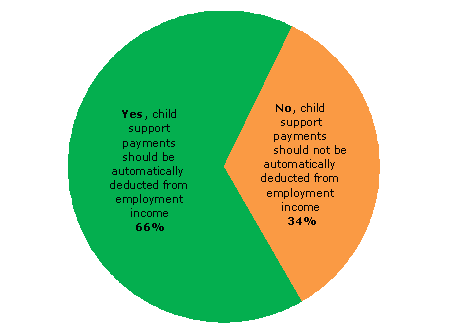
Q2: Do you think that child support penalty rates should be reduced after the first year of default (or penalties capped) and other enforcement measures more widely used?
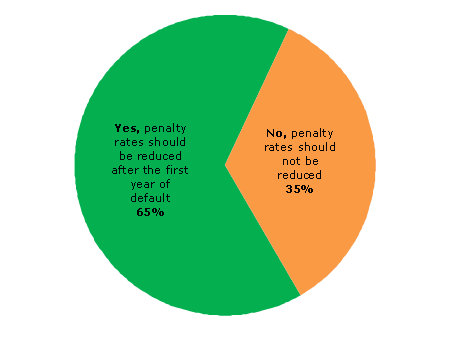
Q2(a): If you think that child support penalty rates should be reduced after the first year of default (or penalties capped), which additional enforcement measures should be introduced at the same time for paying parents that continue not to pay?
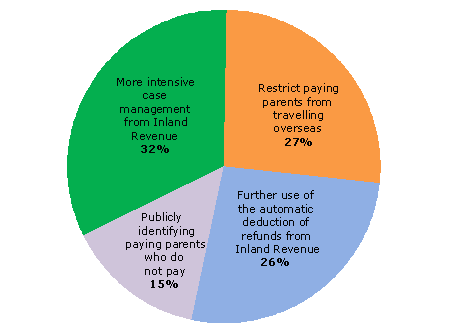
Q3: Do you think that child support penalties should be better aligned with the penalty and use-of-money interest rules that apply for tax purposes?
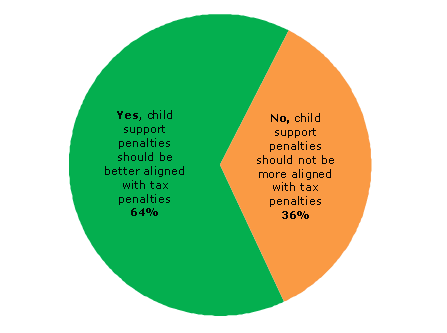
Q4: Should the ability to write-off child support penalties be further relaxed?
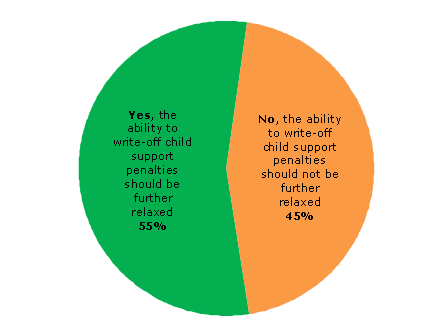
Q4(a): If the ability to write-off child support penalties were to be further relaxed, which options should be considered to achieve this?
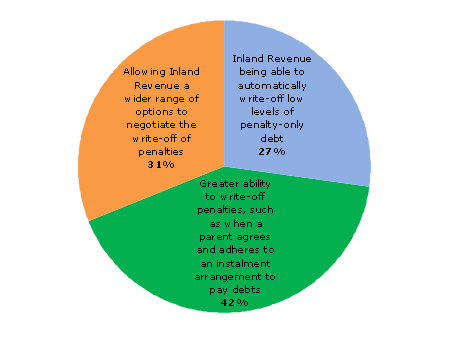
Q5: Should the Government be able to write-off child support debt owed to it on serious hardship grounds, for debts owed to it?
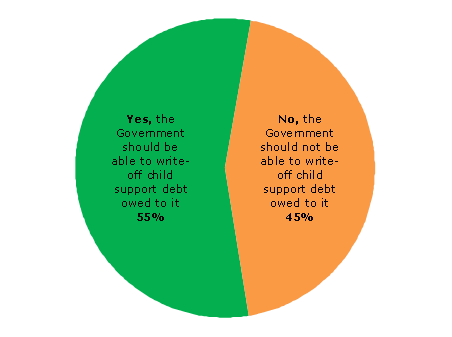
Summary of comments on payments, penalties and debt
Automatic deduction of child support payments from employment income
Automatic deductions from employment income had wide support, although some concerns were raised in respect of privacy and compliance costs for employers. Submitters who did not support the option objected to the prospect of having a specific payment method imposed on them when they were compliant. They felt that they should be trusted to make their own arrangements, with this option only being used for non-compliant parents.
Some submitters noted that a similar measure does not extend to the self employed – an area where some believe manipulation of income for child support purposes is occurring.
Penalty rates, and other enforcement measures
Many submitters considered that, with the Government facing increasing levels of child support debt, it is imperative that the negative impact of the current penalties regime be addressed. This view can be summed up by one submission that contended that late payment penalty rates are far too harsh and overly penal to the extent of discouraging paying parents once they incur a debt, resulting in:
- an increase in debt problems; and
- discouraging voluntary compliance.
In terms of additional enforcement measures that could be imposed in lieu of reducing penalty rates, most of the options canvassed were supported. However, it was noted that these should be balanced against resourcing and privacy issues. The privacy implications of “naming and shaming” certain non-paying parents, especially if any disclosure were subsequently found to be incorrect, were of concern to some.
There was some support for better aligning late payment penalties for child support to those applying for tax on the basis that it would make things easier, therefore helping voluntary compliance and also reducing administration costs.
There was little support for applying use-of-money interest (UOMI) on unpaid child support. However, there was significant support for passing some or all late payment penalties on to receiving parents (who are not receiving the domestic purposes benefit) to compensate them for the fact that they have not received their child support on time.
Writing-off penalties and child support debt in certain circumstances
Support for this proposal tended to be conditional on amounts only being written-off if this resulted in payment of core child support debt or, in the case of amounts owed to the Government, in extreme and proven cases of hardship.
A common comment was that any changes should not be seen to be diluting the disincentive effect of penalties – therefore they should not be written-off too easily. A greater level of discretion in writing-off penalties in genuine cases when this would result in payment was, however, generally seen to be helpful. Additionally, some felt that paying parents who otherwise comply should not be unduly penalised for making an occasional error or omission.
Comments on payments, penalties and debt
General comments on payments, penalties and debts
“The debt issue is secondary to actually ensuring that parents receive the money they are entitled to.”
“The system needs to be fair. Families need to be encouraged to sort things out for themselves and I believe government agencies need to keep out of these situations as much as possible as they are often very complex. I think the first option should always be for a private arrangement to be made (with guidelines available), and the child support system should only be a fall-back if an agreement by the parties can't be reached.”
“PLEASE PLEASE AMEND THE PENALTY REGIME! Most of the largest amounts/periods of debt are uncollectible, due to [an] individual's circumstances, but no ‘discretion’ is given or provision made to ‘assist’ debtors, and many become embittered with their dealings with IRCS, leaving them LESS compliant, and destroying any possibility of remaining involved with or caring for their children – the children suffer because of the very financial support that ‘punishes’ one or both of their parents.”
“It’s grossly unfair. It’s punitive and ultimately money going to the penalties and interest is money not going to the children. It’s not in the best interests of the children and if it was so successful at achieving the aim of getting parents to pay why is there so much owing.”
“If CS was fair in the first place, I think a lot more people would pay. For those that do pay, CS is a financial burden designed to support an ex's life style (not the child) and this does not create an environment for good compliance.”
“Penalties and debt should be at the discretion of the parent caring for the child/ren as to whether it should be written off.”
Automatic deduction of child support payments from employment income
“Without a doubt this should be compulsory.”
“[It] enables a ‘hassle free’ option and is able to be a special tax code. [It] doesn't work as well for variable wage earners but is good for salary earners.”
“By doing [it] this way it saves the ‘he said, she said’ situations that occur with private arrangements. Also, for those that currently go through the IRD system, it will hopefully mean that the payments will come through more regularly and no longer be reliant on the honesty of the “paying” parent. In my situation, the paying parent has done all he could to avoid paying, including stating to a recent employer that he was making payments directly to IRD when he wasn't.”
“I think the liable parent should be able to have a choice as to how they pay. Currently if the liable parent does not make their payments then there is the auto option of placing the deduction onto the employer. You need to give the liable parent the benefit of the doubt to be able to deal with their own finances and not assume that payment will not be forthcoming as a number of people would not like their employer to know of their personal circumstances which is private to them.”
“Child support payments should only be automatically deducted from employment income if an individual fails to pay two consecutive monthly payments. There are plenty of us ‘paying non-custodial parents’ (sharing care 50% of the time) that actually pay child support on time as we are led to believe it is in the best interest of our children.”
“It’s a privacy matter. IRD should not be the watchdog to this. [The] paying parent should pay the other parent directly.”
“When I had wanted to have child support deducted from my income before I received it, IRD was unable to accept my voluntary request. I found this illogical as I pay tax via PAYE, why not just up PAYE at a special tax rate and apportion the child support out of the PAYE that is received. That way I avoid missing a payment and IRD gets the money in a timely way. Having to manually set up separate payments for child support is stupid and it was a major hassle for me remembering to pay on time.”
“Child support is a private and personal affair which employers have no need to know about. It also creates an additional burden on an employer, and if the employer does not subtract the correct amount, the paying parent may end up with an additional bill (and extra penalties?)to manage through no fault of their own. Essentially, child support is a personal responsibility that an employer has no business in.”
“What about self-employed people?”
“It is not fair to have a person's private life made public at work. Plus the employer would have to meet the cost of administering this additional deduction.”
“This only targets PAYE earners – what about all the self-employed parents who minimise their income to avoid CS?”
Penalty rates and other enforcement measures
“More intensive case management from IRD would be fantastic, instead of it being based on the ‘dripping tap’ scenario which happens currently. By using other enforcement measures rather than solely penalty rates it may act as an incentive for the paying parent to keep up to date with their payments.”
“Capped when it becomes apparent they aren't going to pay... no point adding fines on top of fines that then become bigger than the initial debt and don't show a true representation of unpaid child support, but rather unpaid fines with some unpaid child support.”
“The 10% penalties are fair but not the 2% penalties. The liable parent is never happy to suddenly see a debt of $100,000 which includes all the penalties when the original child support portion is only a few thousand dollars. This makes it very hard to collect the outstanding child support.”
“If the system was fairer there would likely be less defaults.”
“I don't see the point in penalising people on a monetary level. It just adds to the problem. Majority of people don't pay because they are unable to, the situation with the receiving parent is difficult or they think the calculation is unfair (shared care etc). I think if a paying parent defaults, then IRD should apply for an attachment to wages/benefit.”
“I think penalising people is not going to make them pay any quicker. I think helping paying parents pay on time might help.”
“First off penalties should be reduced, ie if payment is missed by one day or so or if there have been regular payments but for some reason a payment is suddenly not made. Take longer to impose penalties but then be more forceful after attempts have failed to get that parent to pay.”
“Once penalties get high they are ignored. Increased management via personal contact would be beneficial.”
“Parents who choose to ignore their responsibilities should be encouraged to face their responsibility. They know the consequences of avoiding childcare so removing penalties, in my view, won't necessarily make them pay if they've continually avoided their responsibilities in the past.”
“Penalty payments fail to benefit children as they are not passed on. Penalties cripple paying parents’ ability to get back to a level score card and to feel good about contributing even if it is in a purely financial way to the lives of their children – paying parents are penalised in many other ways – your terminology reinforces winners and losers – the fact they are not passed on to the children adds insult to injury.”
“Failure to pay child support should be like in America, ‘a criminal offence’ and an arrestable offence. There is no excuse for not paying.”
“Penalties need to be actually enforced! Any parent with late payments should not be able to leave the country regardless of the amount. This is a principle that should be enforced. If the paying parent has the money to travel overseas they have the money to pay child support. If the paying parent has to travel for work, then it is a stronger incentive to pay on time so as not to affect their employment. Payment should be deducted from their wages and there would not be a problem in this area.”
“I don't support publicly identifying non-paying parents – this is pretty ‘out there’.”
“I don't see the point in penalties – it just puts people further into debt. I would understand if the money got passed on to the custodial parent as we generally incur costs when the child support doesn't get paid – but the money doesn't get passed on – it goes into the Government coffers.”
“Tougher measures need to be brought in for recovering money from self-employed people, including taking money from their personal, company and trust bank accounts.”
“You identify non-paying parents and you humiliate a child.”
“Penalties should be removed altogether. Why punish the paying parent further? And if compulsory deductions are introduced this will be a minor problem which can be addressed case by case.”
“I would suggest that instead of the 10% lump sum penalty, that a say 1% or 2% (min $5) amount be immediately added and that would increase if the amount was still unpaid say 7 days later (depending on how quickly notice was given of the missed payment). This would mean there was incentive for the paying parent to pay up as soon as possible. IRD should also be able to make the payment to the receiving parent between normal payment dates.”
“I think the penalties should be high at first and then reduce if it is demonstrated that the person pays on time has an issue/communicates with IRD. If the person defaults/is late and has one chance to redeem themselves it goes back to the initial penalty. If penalties were capped after a certain point then [there is] no incentive for someone who has reached that point to clear their debt.”
“I want to see interest on the outstanding money be added to the amounts and collected and given to the parent who has been supporting the child, while waiting for the other parent to ‘get around’ or completely avoid paying child support.”
Writing-off child support penalties in certain circumstances
“If the penalties are contributing to the non-payment (due to stretching [a] paying person’s income more) then they should be able to be written off as long as the payer enters into a contract to pay regular CS.”
“Greater ability to write-off penalties if agreement made and adhered to...for the full term of the debt repayment...not for 6 months and stop paying again... Anything long-term should incur additional debt... Encourage fast payment, quick resolution, avoiding long-term debt. But severe penalties for long-term non/erratic payment. And penalties written-off for quick repayment of any arrears and those who show a long-term good history of payment.”
“Empathy for both parties is paramount – an error once in a blue moon simply doesn't justify your penalties.”
“Penalties were supposed to be a way of getting someone to comply. From the CS debt figures released recently it [is] clear that it is making some people hide under a rock as the amount has got out of control. And the only person that suffers is the child especially since the child does not see any of the penalties if they are ever paid.”
“IRD needs to have options available to the paying parent who has incurred penalties, especially if there is a payment arrangement in place. It would encourage them more to stick to the arrangement and feel better about it as they see the amount reducing further faster.”
“Increase IRD's options and discretion to write off penalties, but don't actually make write-offs easy to obtain or assumed. The main point of penalties is to be a disincentive to default on payments, so the penalties need to be believable while not driving people to despair if they are genuine in their intent to pay and their reasons for not.”
“Maybe review at some future stage after impact of this review and any changes implemented can be evaluated.”
“The aim is to make a paying parent compliant so any incentive to get them to pay can be an advantage. At present waiting 26 weeks to write off penalties is too long. A liable parent’s circumstances can change frequently so one missed payment can result in the earlier repayment arrangement being invalidated. Is it possible to have an ongoing regime where write-off is effected relative to the amount paid?”
“Having relaxed policy and legislation provides Inland Revenue with greater negotiation movement. Any penalty should only be written off or wiped once full payment is made though. Not before. Being able to write off smaller debts will also reduce the huge amount of Child Support debt.”
“All penalties should stay, otherwise they aren't penalties. The problem is not in the write-off, the problem is in the penalty imposed in the first place.”
“Only if the receiving parent agrees to it.”
“Some of the penalty should be paid to the custodial parent as quite often they go without if child support is not paid so that the child does not miss out.”
Writing-off child support debt owed to the Government (note, not amounts owed to receiving parents) in certain circumstances
“It is not going to affect the receiving parent so makes no difference to them, however I wouldn't like to see this happen to every liable parent, it would have to be on serious hardship grounds. I would also like to see terminally ill liable parents considered as a child support debt write-off.”
“They should have it deducted at $10 a week, it may take them a long time to pay off but I know heaps of people that have had to do it.”
“Child support debt should never be written off, whether it be owed to the custodial parent or Government. The responsibility should always remain, even if it is paid off with a minimal weekly payment.”
“Only if wasting time chasing a non-payer is never going to produce results.”
“This would see paying parents treated differently depending on the circumstances of the custodial parent.”
“Any write-off provisions likely to be abused. We have [the] option to suspend collection and should take that step if [there is] no income through ill health.”


